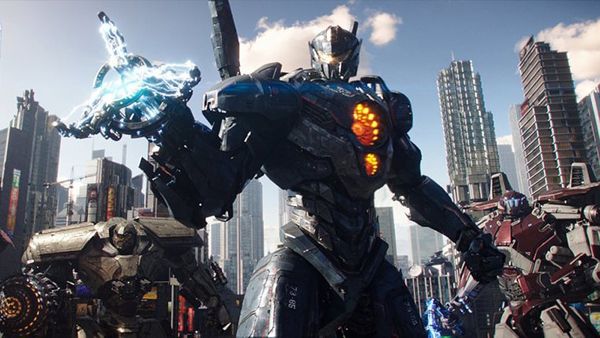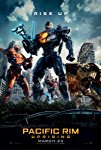Eye For Film >> Movies >> Pacific Rim: Uprising (2018) Film Review
Pacific Rim: Uprising
Reviewed by: Andrew Robertson

Giant robots fighting monsters in the middle of Tokyo. Ultimately everything else sort of falls by the wayside - for some audiences all Pacific Rim: Uprising had to deliver was a succession of massive metal men (and women) punching giant creatures with urban architecture as arena. It's got that, in spades, and with some variety: different giant robots (jaegers, in Pacific Rim parlance); different monsters (kaiju, the film's internal argot borrowing from the Japanese word for 'strange creature' as seen in Godzilla and so on) and, where the issues start, different than Pacific Rim.
I'm still conflicted about Pacific Rim: Uprising, and I suspect you will be too. I don't have the canvas to do more than acknowledge how fans of certain fandom pairings will be affected by one or more of the film's many revelations, additions, and modifications to the original world created by (now double-Oscar winning) Guillermo Del Toro. The film's enjoyable - enough so that I'm planning to see it again in theatre and soon - but its status as a sequel five years after the fact and elements of its (re)genesis are possibly evident on the screen.

John Boyega's turn as Jake Pentecost (previously unmentioned son of Idris Elba's Stacker Pentecost) is at the heart of a film that tries to balance respect for a previous film, a more free-wheeling irreverence and lighter tone, and perhaps most importantly a premise that is, let's face it, daft.
Now don't get me wrong - I'm exactly the kind of person who gets unreasonably offended by tiny issues within films (don't get me started on Cloverfield's casualness with video formats) - but I'm willing to forgive a cavalier disregard for the inverse-square law and a fly disregard for aerodynamics if it's in service of enjoyable entertainment. Fail to captivate an audience for long enough and disbelief will snap them out as surely as Wile E Coyote will fall when he looks down. Pacific Rim: Uprising manages this task, though at times it seems to making a rod for its own back. Pacific Rim's secret was to balance occasional humour with an at times po-faced sensibility, helped by Idris Elba's oft stentorian gravitas. Uprising's tone is similarly grounded in a Pentecost, but Boyega's Jake is more slacker than Stacker.
The opening sequence exploring the hustles and scams of the post-Kaiju-war Pacific coast(s) is genuinely entertaining, setting a tone almost immediately that the film does well to both sustain and stray from. Reminiscent of the "Know A Guy" montage from Ant-Man, the elements of picking over the wreckage of a fight for survival to make profit elsewhere are perhaps not intentionally reminiscent of the process of funding a sequel not expected to get one, but the parallels are there.
There are some odd production notes - for a start, Uprising gets its own versions of studio logos, an honour not often afforded. It's a small detail in a film full of them - some of them homage to its precursor, some of them to even earlier antecedents. Though climactic battles take place on the streets of Tokyo the nods to Kaiju previous are sometimes subtler than the men in suits being monsters and men in suits that make them look like monsters of Shin Gojira. In other places the nods are in name only - I don't want to call it "outright disregard" for established mechanics like drift and a similarly 'novel' sequel-established goal for the baddies, but I could make the case.
It does meet a key test for a sequel in that it builds upon and shows respect for its previous work, but this isn't a slavish tonal reproduction like The Force Awakens nor is it as bold a respectful reinvention as The Last Jedi. Nor, admittedly, is it a Rogue One - same place, different feel - this is Pacific Rim too, but some elements of it are dependent on things that change how the last film gave us to understand how the film works. The seminal work on fandom entitlement is still probably Anne Wilkes in Misery, and while there's nothing here that'll have the average viewer shouting that nobody got out of the cock-a-doodie car, Pacific Rim has a core constituency who are not the average viewer. They are going to have, are having, trouble with PR:U and I don't blame them.
I've a few rules of thumb for films, and one of them relates to the number of writers - here we've four and a 'based on' credit. Including director Steven S DeKnight (previous credits are all television, including musical oddity Viva Laughlin, Whedon-bait Dollhouse, two different versions of Spartacus and apparently a show that actually exists called Travel Boobs), there's Emily Carmichael (a large number of shorts and animated works based on retro-video games, or for readers of a certain age, 'video games'), Kira Snyder with a number of TV credits and early Alternate Reality Game (so much so that it featured AOL instant messenger content) Majestic, and TS Nowlin (whose pen played a role in all three Maze Runner films). There are tonal oddities - there's enough going on in the film that one does wonder if it might have worked better as one of these new-fangled televisionesque series, and its clear that there's sequel opportunity (if not intention). The rule of thumb is that the more writers a film has the more troubled it's likely to be, and despite the quality of its parts (some more tightly wound than others, some wound in directions no-one else would have chosen), Pacific Rim: Uprising is in that camp.
If it seems a mixed bag of writers, it's even more so for fan favourite characters created by and with Travis Beacham for del Toro's film. There are some glaring, totally unacknowledged, omissions - some characters are referred to in flashback, in video mausoleums, in names and places - and three return - Charlie Day and Burn Gorman as doctors Geiszler and Gottlieb, still doing sterling turns as adorable delivery mechanisms for exposition and fan-fiction opportunities, and Rinko Kikuchi as Mako Mori has parlayed that whole 'saving the world' thing into a surprisingly exciting desk job. New characters in the form of rogue Jaeger builder Amara Namani (Cailee Spaeny, whose chemistry with Boyega speaks not only to her talent but his experience working as and with young actors), mysterious establishment Jaeger builder Liwen Shao (Tian Shan, probably most familiar to giant monster fans from Kong: Skull Island), and establishment Jaeger Pilot Nate Lambert (Scott Eastwood, who I've definitely seen in things I've seen but could not swear to recognising despite his pedigree) are added, and it's genuinely pleasing to see that as many of them are female, but sequels aren't necessarily about the new.
Uprising manages at times to make me feel exactly the same way Pacific Rim did - impressed at the effects (though I've not bothered with 3-D, it amply fills the screen without), amused when it wanted me to laugh, annoyed at the fact that fictional pilots fighting giant imaginary monsters in the space year 20-whatever have still not learned the cautionary lesson of 1933's King Kong which is "don't fly your plane where you can be punched". It does make reference to the fascinating concept of 'drift', but the sequel squanders some of the opportunities afforded by mechanically induced collective consciousness in favour of semi-synchronised stepping and sword-wielding, lit up like a spin class in a slot-machine. It manages some moments of outstanding implication through minor detail, but at other times its world-building seems clumsy justification for additional action sequences. One in particular is too large to be crow-barred, requiring two air-drops to arrange a particular battle. It's overwhelmingly better than its near equivalent in Robot Jox, but that's a cold comparison.
It's only been in the course of writing this that I've realised that Uprising is a full 20 minutes shorter than Pacific Rim - production realities aside it's definitely had time saved for it by the world building that del Toro did. He returned as visual consultant for this. This is something that attempts to build on a legacy, and much like its characters it struggles at times, but more or less comes good. There's a lot here - the TV CVs of much of the director and co-writers means that it feels cheap to describe the film as episodic but it's not inaccurate. There's a metatextual thing going on as well - one of the fascinating aspects of Pacific Rim was the extent to which it felt like a live-action translation of an anime, and Uprising has that same feel, but it's closer perhaps to the dub of an American re-cut. This despite the clear focus on overseas markets as it was those that gave Pacific Rim even the chance of a sequel, but Boyega's involvement was instrumental. What you're left with though is something that feels like a sequel made by fans, with commercial realities intruding, and fans who liked most of the things you liked but maybe not the same ones. Though obviously it's effectively impossible for me to separate the fact the film made me feel like it felt like that from the fact that that's what it is to me.
At the most basic level, giant robots fighting monsters in the middle of Tokyo. Ultimately everything else sort of falls by the wayside. There's a moment where audiences waiting for giant monster action are likely to clap hands with glee - almost immediately followed by something happening on screen that feels like a call-out. Fan service is a difficult game, however - for everyone who'll be left blown away there will be some not turned off, but cut.
Reviewed on: 30 Mar 2018


















